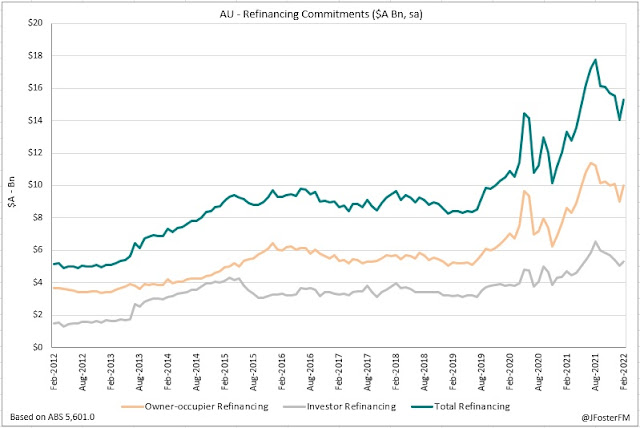Australian housing finance commitments fell for the first time in four months in February, easing from record highs. Declines were seen in both major segments, with owner-occupiers -4.7%m/m and investors -1.8%m/m, likely reflecting a slowdown in activity during the Omicron wave and summer holiday period. Much of the weakness came in New South Wales after a strong rebound from the Delta lockdowns.
Housing Finance — February | By the numbers
- Housing finance commitments ($ value, ex-refinancing) declined against expectations falling by 3.7% in February to $32.3bn vs a 1.5% rise expected and coming off a 2.5% m/m lift in January. Annual growth in commitments slowed from 17.7% to 12.6%.
- Owner-occupier commitments were down by 4.7% on the month to $21.5bn to be 1% lower over the year. In the month prior, commitments to the segment lifted by 0.8%.
- Investor commitments fell for the first time in 16 months, down 1.8%m/m in February to $10.8bn, but this followed a 6.1% surge in January and commitments are up almost 56% over the year.
- Refinancing activity rebounded from the prior month's 9.4% fall to be up 8.6% in February at $15.3bn, for an annual gain of 14.7%.
Housing Finance — February | The details
Australian housing finance commitments cooled in February (-3.7%) after surging to record highs in December and January. This result likely reflects some Omicron and holiday-related weakness early in the new year. A 4.7% decline in the owner-occupier segment drove the headline fall in commitments, though investor commitments were also lower on the month (-1.8%) and posted their first contraction since October 2020.
The weakness in the owner-occupier segment centred on a 6.1% fall in commitments to upgraders while first home buyer commitments weakened by 9.7%m/m following January's 5% decline. Construction-related lending softened by 0.8%m/m.
As the next chart highlights, there were large falls in owner-occupier commitments in New South Wales (-10.5%) and Victoria (-5.2%) in the month. This was after post-lockdown surges in these states, with the emergence of Omicron and summer holidays likely playing a part. Declines were also posted in South Australia (-7.6%) and Queensland (-3%).
National declines in the volume of approvals in February in the upgrader (-7%) and first home buyer (-8.3%) categories appear consistent with the disruptions from Omicron and slower activity around the holiday period.
The fall in investor commitments was a modest 1.8% after 15 consecutive months of expansion. New South Wales drove the decline posting a 5.5%m/m fall, with weakness also coming through in South Australia (-4.8%) and Queensland (-2.6%). Investor commitments in Victoria were flat on the month. According to CoreLogic data, rents are increasing at above-average rates and the higher-density segment is seeing an acceleration after being hit hard over the course of the pandemic, a positive for further investor activity.
Refinancing activity found some support in February rising by 8.6% in the month after retracing by nearly 21% from their mid-2021 peak. Further strength in refinancing activity shapes as likely over the coming months given the increasing speculation around RBA rate increases.
Housing Finance — February | Insights
Housing finance commitments weakened unexpectedly in February but remain very elevated sitting just off record highs. The disruptions from the Omicron wave and peak summer holiday period are likely showing through in today's report. Earlier this morning, CoreLogic's monthly house price data reported a divergence in conditions with the Sydney and Melbourne markets seeing declines in March against a faster pace of gains in several other capital cities. In the release, CoreLogic noted affordability concerns, increased listings, expectations for interest rate rises and higher inflation reducing disposable incomes as factors that point to a cooling housing market in 2022.








